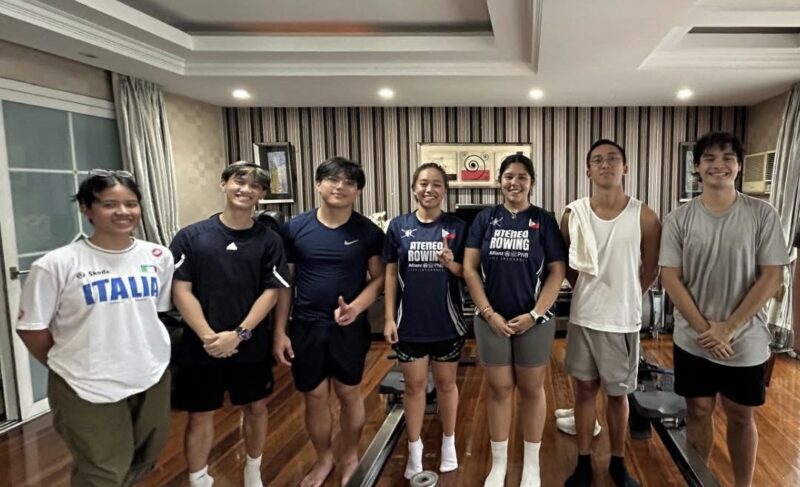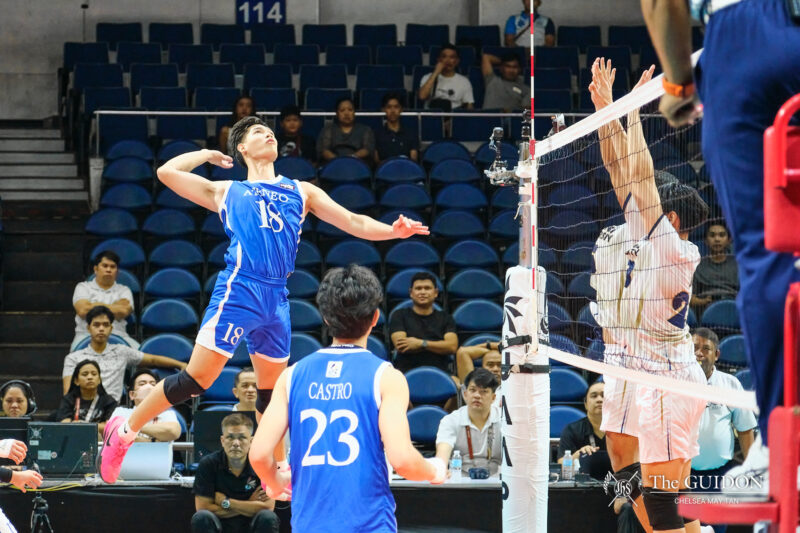The School of Social Sciences (SOSS) Sanggunian School Board, in partnership with Ateneo Peers, organized “Spectrum,” the university’s first Lesbian, Gay, Bisexual and Transgender (LGBT) Pride Week held from December 2 to 5.
Project Head Kristine Ongtengo said that the project organizers hoped to encourage better discourse so as to challenge the the stereotypes that have resulted from the misrepresentation of the LGBT community.
However, the project was met with criticisms due to the lack of student participation during the Pride Parade held on December 2 and for the “campy” execution of the Cross Dress Day held on December 3.
The other activities held during the LGBT Pride Week were the following: A demonstration debate by the Ateneo Debate Society (ADS), a film-screening of Lukas Moodysson’s Show Me Love on December 4 and an LGBT-themed forum on December 5.
Question of execution
A Pride Parade signaled the start of the event. However, Ongtengco said that there were only around 5o participants.
Project Head Marianne Vitug attributed the poor turnout to the limited promotion of the project through the SOSS Sanggunian Facebook page.
“That was a shortcoming on our part to not have not cooperated with a wider network of people,” she said.
Meanwhile, students were encouraged to wear their “most fabulous attires” during the parade and the Cross Dress Day.
According to Vitug, the Cross Dress Day allowed people to “walk in somebody else’s shoes for a day” and to see that there is no need to “dress [in] a certain way or conform to [any] standard.”
However, English Department Lecturer Miguel Lizada questioned the rationale for encouraging such attire.
“You’ll be cross dressing, but what is at stake?” Lizada asked, adding that the move encouraged “being campy,” which, he says, is synonymous to being transgressive.
He added that events such as the LGBT Pride Week need to break down the social boundaries set for the LGBT community regarding the way they dress.
Lizada recalled a previously published online article of The GUIDON about Dollhouse, the university’s most prominent LGBT group.
Several people commented on the article, criticizing Dollhousers for encouraging camp and for not properly representing the LGBTs in the Ateneo.
Lizada said that while the display of camp and drag are “legitimate kinds of expression for queer identity,” there are other “kinds of expression here in the campus.”
“Positive reinforcement”
Despite criticism of the execution of the LGBT Week project, there were members of the Ateneo community who nonetheless felt it was important to hold the event in school.
Development Studies Department Lecturer Edwin Salonga, PhD said that the LGBT Pride Week served as “a positive reinforcement” for the various members of the LGBT community, as it could make them realize their potential to be productive role models.
“If you are being recognized as someone who is being very productive, healthy and living a conscientious life, I think that’s a very good motivator for you remain to do so and excel more,” said Salonga
Meanwhile, Lizada said it was necessary to hold events like the LGBT Pride Week in a non-secular setting such as the Ateneo.
“Christianity is really about love… and I think one of the values that this LGBT Pride week can offer is to come up with a greater understanding, because love can begin in understanding,” he said.
Behind pride parades
As part of the project, ADS members conducted a demonstration debate held in MVP 217-218 with the motion: “This house believes that gay pride parades have done more harm than good for the LGBT movement.”
Opposition Leader Denise Recomono argued, “There are people who aren’t anti-gay, but they just don’t feel the need to think about these issues. Parades help this lack of awareness.”
In response, Deputy Prime Minister Matthew San Pedro said, “Announcing their (LGBTs) existence does nothing; we already have this awareness. If you only forward the extremes, you harm the movement.”
San Pedro also said that parades reflect an image of rarity, thus making the LGBT community look like a “spectacle.”
No team was declared winner after the demonstration debate.
Insights on the LGBT community
The LGBT-themed forum entitled “Stories: A Spectrum of Voices” was held in Bellarmine 308. It sought to inform audience members about the experiences of the LGBT community in the Philippines.
The forum speakers included the following: Television and radio personality Danton Remoto, Gay and Lesbian Activist Network for Gender Equality (Galang) Executive Director Anne Lim and former University Student Council of the University of the Philippines-Diliman (UP-D) Chairperson Heart Diño.
The forum started with Remoto’s narration of the struggles faced by the Ang Ladlad partylist, the only political party representing LGBT Fillipinos.
According to Remoto, Ang Ladlad was formed in 2003 to focus on the promotion of the Anti-Discrimination bill.
The bill advocates for the LGBT community members’ equal rights in school and in the workplace and equal rights to acquire license to work and open business.
Afterwards, Diño shared the plight of transgenders in the Philippines. She defined transgenders as individuals who express their chosen gender identification in contrast to their assigned gender.
Diño said that the society finds it hard to accept bisexuals and transgenders because society confines gender to only four categories: Girl, boy, gay and lesbian.
She also explained that that gender orientation relies on gender identity, gender expression, biological sex and sexual orientation.
Lastly, Lim talked about the marginalization of the LGBT community.
She showed a video presentation of Galang, a non-government organization (NGO) that advocates for the rights of lesbians, transgenders and bisexual women in urban poor communities.
Future plans
Despite receiving negative feedback, several members of the Ateneo community feel that the Pride Week should be an annual event.
“Nothing is set in stone as of now, but we organized this event bearing in mind that it would hopefully be the first of many… There’s much left to do and try,” Vitug said.
She added that future plans for LGBT Pride Week will depend on the priorities of the SOSS Sanggunian next year.
Salonga, however, said that it is necessary for the LGBT community to form a united front because the issue cannot be resolved by individual actions alone.
“If you really want to create a better program next year to continue the LGBT week, you need not have just individual members talking to the administration… You need a group to do that,” said Salonga.The School of Social Sciences (SOSS) Sanggunian School Board, in partnership with Ateneo Peers, organized “Spectrum,” the university’s first Lesbian, Gay, Bisexual and Transgender (LGBT) Pride Week held from December 2 to 5.
Project Head Kristine Ongtengo said that the project organizers hoped to encourage better discourse so as to challenge the the stereotypes that have resulted from the misrepresentation of the LGBT community.
However, the project was met with criticisms due to the lack of student participation during the Pride Parade held on December 2 and for the “campy” execution of the Cross Dress Day held on December 3.
The other activities held during the LGBT Pride Week were the following: A demonstration debate by the Ateneo Debate Society (ADS), a film-screening of Lukas Moodysson’s Show Me Love on December 4 and an LGBT-themed forum on December 5.
Question of execution
A Pride Parade signaled the start of the event. However, Ongtengco said that there were only around 5o participants.
Project Head Marianne Vitug attributed the poor turnout to the limited promotion of the project through the SOSS Sanggunian Facebook page.
“That was a shortcoming on our part to not have not cooperated with a wider network of people,” she said.
Meanwhile, students were encouraged to wear their “most fabulous attires” during the parade and the Cross Dress Day.
According to Vitug, the Cross Dress Day allowed people to “walk in somebody else’s shoes for a day” and to see that there is no need to “dress [in] a certain way or conform to [any] standard.”
However, English Department Lecturer Miguel Lizada questioned the rationale for encouraging such attire.
“You’ll be cross dressing, but what is at stake?” Lizada asked, adding that the move encouraged “being campy,” which, he says, is synonymous to being transgressive.
He added that events such as the LGBT Pride Week need to break down the social boundaries set for the LGBT community regarding the way they dress.
Lizada recalled a previously published online article of The GUIDON about Dollhouse, the university’s most prominent LGBT group.
Several people commented on the article, criticizing Dollhousers for encouraging camp and for not properly representing the LGBTs in the Ateneo.
Lizada said that while the display of camp and drag are “legitimate kinds of expression for queer identity,” there are other “kinds of expression here in the campus.”
“Positive reinforcement”
Despite criticism of the execution of the LGBT Week project, there were members of the Ateneo community who nonetheless felt it was important to hold the event in school.
Development Studies Department Lecturer Edwin Salonga, PhD said that the LGBT Pride Week served as “a positive reinforcement” for the various members of the LGBT community, as it could make them realize their potential to be productive role models.
“If you are being recognized as someone who is being very productive, healthy and living a conscientious life, I think that’s a very good motivator for you remain to do so and excel more,” said Salonga
Meanwhile, Lizada said it was necessary to hold events like the LGBT Pride Week in a non-secular setting such as the Ateneo.
“Christianity is really about love… and I think one of the values that this LGBT Pride week can offer is to come up with a greater understanding, because love can begin in understanding,” he said.
Behind pride parades
As part of the project, ADS members conducted a demonstration debate held in MVP 217-218 with the motion: “This house believes that gay pride parades have done more harm than good for the LGBT movement.”
Opposition Leader Denise Recomono argued, “There are people who aren’t anti-gay, but they just don’t feel the need to think about these issues. Parades help this lack of awareness.”
In response, Deputy Prime Minister Matthew San Pedro said, “Announcing their (LGBTs) existence does nothing; we already have this awareness. If you only forward the extremes, you harm the movement.”
San Pedro also said that parades reflect an image of rarity, thus making the LGBT community look like a “spectacle.”
No team was declared winner after the demonstration debate.
Insights on the LGBT community
The LGBT-themed forum entitled “Stories: A Spectrum of Voices” was held in Bellarmine 308. It sought to inform audience members about the experiences of the LGBT community in the Philippines.
The forum speakers included the following: Television and radio personality Danton Remoto, Gay and Lesbian Activist Network for Gender Equality (Galang) Executive Director Anne Lim and former University Student Council of the University of the Philippines-Diliman (UP-D) Chairperson Heart Diño.
The forum started with Remoto’s narration of the struggles faced by the Ang Ladlad partylist, the only political party representing LGBT Fillipinos.
According to Remoto, Ang Ladlad was formed in 2003 to focus on the promotion of the Anti-Discrimination bill.
The bill advocates for the LGBT community members’ equal rights in school and in the workplace and equal rights to acquire license to work and open business.
Afterwards, Diño shared the plight of transgenders in the Philippines. She defined transgenders as individuals who express their chosen gender identification in contrast to their assigned gender.
Diño said that the society finds it hard to accept bisexuals and transgenders because society confines gender to only four categories: Girl, boy, gay and lesbian.
She also explained that that gender orientation relies on gender identity, gender expression, biological sex and sexual orientation.
Lastly, Lim talked about the marginalization of the LGBT community.
She showed a video presentation of Galang, a non-government organization (NGO) that advocates for the rights of lesbians, transgenders and bisexual women in urban poor communities.
Future plans
Despite receiving negative feedback, several members of the Ateneo community feel that the Pride Week should be an annual event.
“Nothing is set in stone as of now, but we organized this event bearing in mind that it would hopefully be the first of many… There’s much left to do and try,” Vitug said.
She added that future plans for LGBT Pride Week will depend on the priorities of the SOSS Sanggunian next year.
Salonga, however, said that it is necessary for the LGBT community to form a united front because the issue cannot be resolved by individual actions alone.
“If you really want to create a better program next year to continue the LGBT week, you need not have just individual members talking to the administration… You need a group to do that,” said Salonga.






